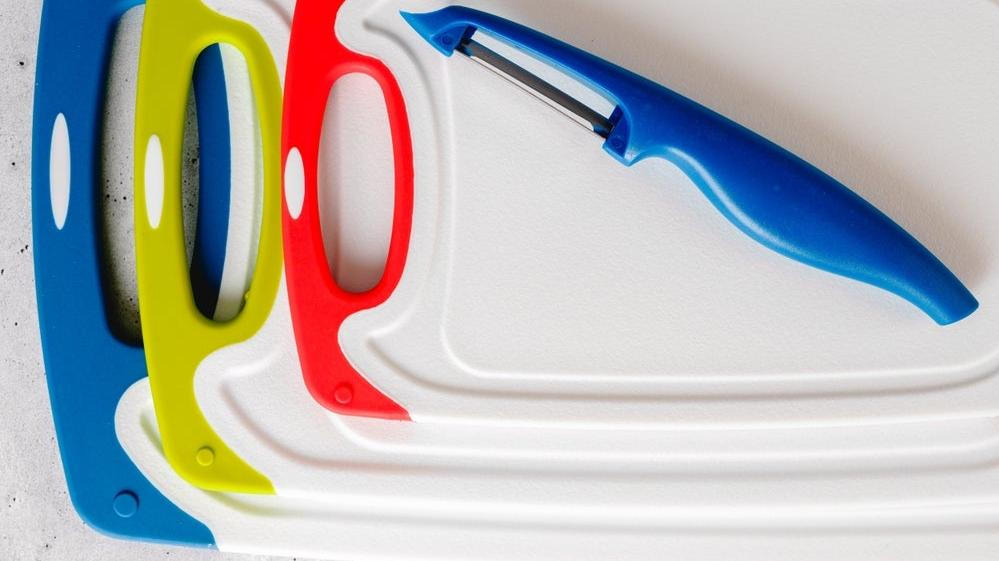You Need More Than One Cutting Board
Diversity is the key to a safe home cooking routine.
We may receive a commission on purchases made from links.
Inside the burning carcass of Twitter (X), a conversation has arisen that has caused a great divide in our nation. No, it's not a political debate. Instead, it's culinary: What kind of cutting board should you use? After someone reignited the conversation about how many plastic particles flake off into your food whilst using a plastic cutting board, user Aya and others chimed in that wooden boards can be just as bad because they harbor bacteria. The third option, glass, is bound to break, and is known to dull knives. Over a thousand people commented with their thoughts. Who's right?
Readers added context to the cutting board debate
Because Twitter is a platform of people saying "actually" at each other until the end of time, readers added context below the tweet, citing peer-reviewed articles on the various experiments done on cutting boards. In these studies, to test how much salmonella sticks to the various types of boards, researchers smeared each cutting board with "chicken juice." That phrase is present in the study. "Chicken juice." So now I'm a vegetarian, and that solves that problem.
This study—which, fair warning, also uses the phrase "chicken juice"—says that new, unscratched plastic cutting boards washed in hot water do not harbor bacteria. However, if you use a cutting board often enough, it'll start to develop grooves or scratches. These visible signs of wear and tear mean the plastic in the cutting board is almost inevitably getting into your food. While we don't know the exact effect that ingesting microplastics has on the body, we know that they are damaging to the environment, clogging waterways and harming wildlife. If you use a plastic board, plan to replace them more often than other types.
Wooden cutting boards
The "chicken juice" study said that regularly oiling a wooded cutting board might help the wood from drying out but does not prevent bacteria, so stop being pretentious about it. However, the study also notes that cleaning your wood cutting boards thoroughly, no matter if they're old or new, does eliminate bacteria more successfully than the plastic boards studied. Experts agree that the harder the wood, the better your chances of sanitation are, and that helps prevent food poisoning. Bamboo is better than cypress. Any wood, should it crack or have deep grooves where juices can settle, should be replaced.
Glass cutting boards
Seeing the Twitter/X debate about cutting boards, I yelled at my computer in the coffee shop, "Then what cutting board am I supposed to use?!"
My friend, a dietician, said glass cutting boards are ideal because their smooth surface can be very thoroughly cleaned. They do dull knives faster, but sharpening knives can be a very satisfying activity. Still, my friend admitted glass boards aren't a great option for people like me, because they are liable to break if you have children who are so hardcore that you can't have nice things. Should you be a DINK, or a nice single lady in a romantic comedy with an inexplicably perfect kitchen, or any other variety of childless person, feel free to get yourself a glass cutting board. If you drop it, it's your own fault.
Rubber cutting boards
Many chefs favor rubber cutting boards because they're durable, don't shed plastics, and are easy to wipe clean. Okay, then how come I've never seen one?
I briefly wondered whether, like baby pigeons, perhaps rubber cutting boards are a myth. But I looked it up (journalism!) and they do exist; they look a lot like plastic ones in terms of design, but they're significantly more expensive. Many people spend money on a nice wooden cutting board because they're attractive, and you can whip up the latest charcuterie board trend with them. However, for people very concerned about not having to sharpen knives, rubber is a good way to go.
So, which cutting board is best?
Avoiding cross-contamination by thoroughly cleaning your cutting board is more important than selecting a certain type. Consumer Reports recommends having several cutting boards in rotation. You need a meat board that's distinct from your veggie board, at minimum. Or, if you only have one, make sure to handle the veggies first, then the meat, washing the board promptly between uses in hot, soapy water. If your board is damaged, no matter the type, you need to replace it as soon as possible. Preferably before you get food poisoning.
